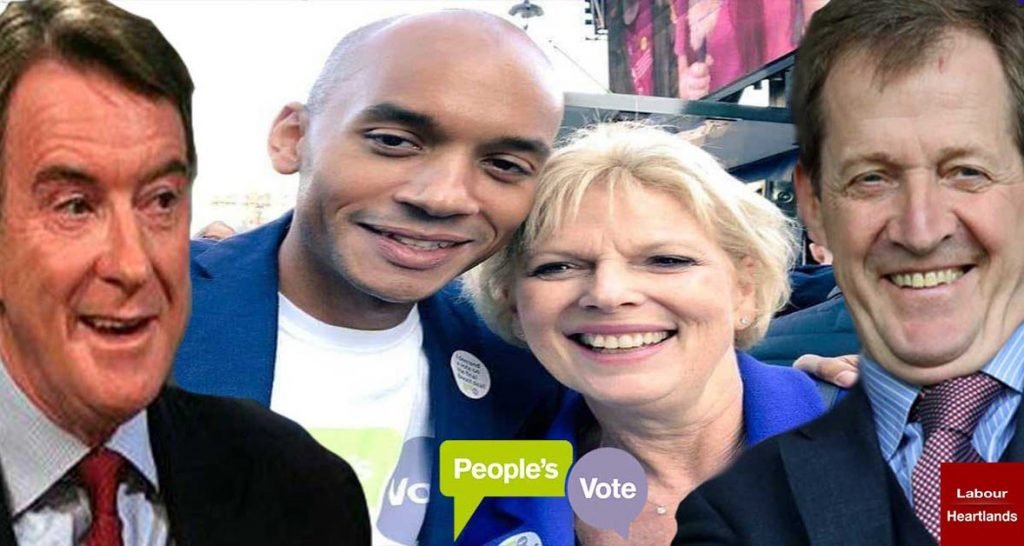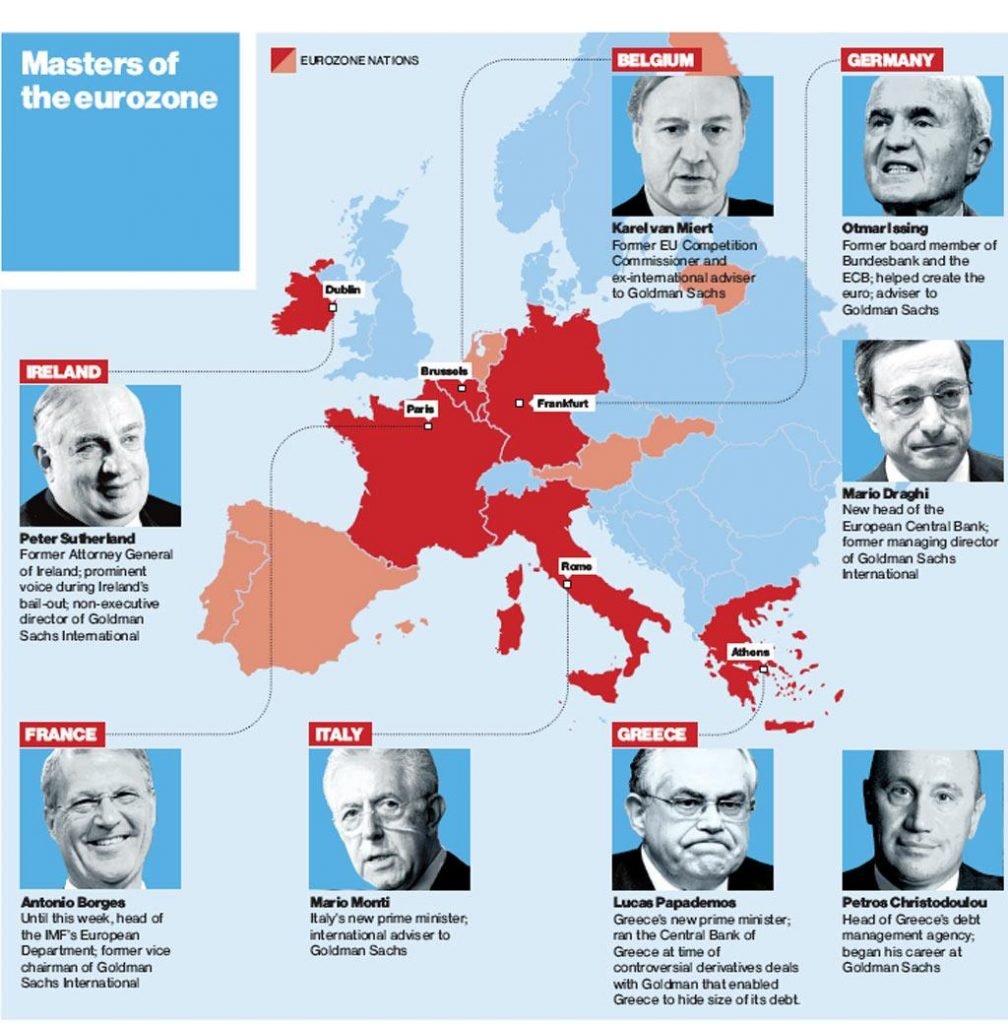The Revolving Door never stops spinning rewarding all Labour’s little traitors
Those that attacked Jeremy Corbyn from within his own party have one thing in common, they have been richly rewarded by the establishment. The main protagonists who constantly undermined Labour or carried out direct attacks on the Left-wing have been made life long unelected peers or in the case of Chuka Umunna promoted directly into the establishments Banking sector, an easy step through the Revolving door.
Chuka Umunna is to move to JP Morgan from the communications company Edelman, which he joined last July to become head of its ESG consultancy team.
Born in Lambeth to a Nigerian father and English-Irish mother, Umunna was educated at St Dunstan’s College, a private school in Catford, Lewisham. He then studied Law at the University of Manchester and Nottingham Trent University.
A teenage member of the Liberal Democrats, he joined the Labour Party in 1997 when the party was styling itself as “New Labour”. He worked as a solicitor in the City of London, first for Herbert Smith and then for Rochman Landau.
Umunna served as Member of Parliament for Streatham from 2010 until 2019. A former member of the Labour Party, he was part of the Shadow Cabinet from 2011 to 2015.
In 2015 he briefly stood for labour Leader but controversially backed out of the Labour Party Leadership competition referred to the “scrutiny and attention” that comes with a leadership contest and said: “I have not found it to be a comfortable experience.”
Umunna left Labour in February 2019, when he resigned over Labour’s stance on Brexit and Jeremy Corbyn’s refusal to campaign for a second referendum. In the meantime, he created as much chaos and negativity as possible while serving as a Labour MP.
Umunna along with six other MPs formed ‘The Independent Group’, who later became ‘Change UK’, Later in 2019, he left Change UK and, after a short time as an independent MP, joined the ‘Liberal Democrats’. In the 2019 general election, he was rejected by the people in his unsuccessful bid in being re-elected as an MP
At the time thousands of voters challenged the Labour traitors to fight for their seats, demanding electoral reform to force MPs who are sacked or resign to contest a by-election.
Following the resignations of the “gang of seven” — Luciana Berger, Ann Coffey, Mike Gapes, Chris Leslie, Gavin Shuker, Angela Smith and Chuka Umunna — many Labour voters insisted they were returned in the last election because of the party they stood for and should therefore stand in a by-election now they have left it.
The then Labour leader Jeremy Corbyn said he was “disappointed” by the resignations adding.
“I hope they recognise that they were elected to Parliament on a manifesto that was based around investment in the future, was based around a more equal and fairer society and based around social justice,” he said.
The Revolving Doors Politicians and Banks

The ultra ‘Remain campaigner’ having created such turmoil within the Labour Party will feel at home ‘Banking’ and not just for any Bank but likewise the ultra EU Remain funding JP Morgan.
JP Morgan, Goldman Sachs along with Morgan Stanley pledged several hundred thousand pounds towards the multi-million-pound fund to Remain in the EU and overturn the democratic vote to Leave.
JP Morgan also hired former Labour Prime Minister Tony Blair as a global advisor after leaving office in 2008.
Many politicians have walked out of ‘public office’ into the private sector, ex-PM Gordon Brown is now an advisory board member of the investment firm PIMCO and three ex-Chancellors have also made the jump.
Philip Hammond is currently a partner of the energy investment outfit Buckthorn Partners and Alistair Darling sits on Morgan Stanley’s board of directors.
Sajid Javid has taken up a job with US bank JP Morgan on an undisclosed salary and will sit on their advisory council for Europe, the Middle East and Africa. He is still a serving parliamentarian. MPs are currently allowed second jobs. However, we cannot hope to radically reform our money and banking system while the big banks continue to entice politicians into their employ.
Sajid Javid’s move from banking to politics and both at the same time also mirrors the journey of our current Chancellor Rishi Sunak, who worked for the investment bank Goldman Sachs before taking up his parliamentary seat in 2015. Sadly this handful of past residents from Numbers 10 and 11 Downing Street only scratch the surface, countless other examples can be found across the civil service, the Cabinet and the House of Lords.
Other major figures within the Remain camp have now been given their rewards Former chancellor George Osborne has given up his job with the Russian owned Remain campaigning Evening standard to become a full-time banker, not that he was not already a Banker having worked for the EU advisory bank Black rock since leaving politics.
George Osborne, the former chancellor who orchestrated the austerity drive after the financial crisis, is dropping his portfolio career to become a full-time banker.
Osborne announced on Last Monday that he is giving up nearly all his current jobs to become a partner at the investment bank Robey Warshaw. The former Conservative MP is currently editor-in-chief of the Evening Standard and the chair of the Northern Powerhouse Partnership. He is also paid £650,000 a year for working one day a week as an adviser to the fund manager Blackrock.
Then, of course, our favourite little Blairite Lord Peter Mandelson the peoples’ vote campaigner and Jeremy Corbyn wannabe nemesis works for the other EU big bank. In 2013, he joined the Board of Trustees of Deutsche Bank
A sequence of unconnected circumstances
The Labour Party under Corbyn had faced many attacks from the Banks, examples can be found when Morgan Stanley’s European Equity Strategy team told investors :
“The UK’s domestic political situation is at least as significant as Brexit, given the fragile state of the current government and the perceived risks of an incoming Labour administration that could potentially embark on a radical change in policy direction”.
They added UK investments may not improve even if Brexit negotiations pass smoothly, unless the Tories’ polling also improves.
Jeremy Corbyn replied to the attack in a video Tweet
When bankers like Morgan Stanley say we’re a threat, they’re right.
— Jeremy Corbyn (@jeremycorbyn) November 30, 2017
The next Labour Government is a threat to a damaging and failed system that’s rigged for the few. pic.twitter.com/v1ujMkngdv
“When bankers like Morgan Stanley say we’re a threat, they’re right. The next Labour Government is a threat to a damaging and failed system that’s rigged for the few.”
A long history of opposing Bankers including the EU

Simon Johnson, the former International Monetary Fund economist, in his book 13 Bankers, argued that Goldman Sachs and the other large banks had become so close to government in the run-up to the financial crisis that the US was effectively an oligarchy.
At least European politicians aren’t “bought and paid for” by corporations, as in the US, he says. “Instead what you have in Europe is a shared world-view among the policy elite and the bankers, a shared set of goals and mutual reinforcement of illusions.”
This is The Goldman Sachs Project. Put simply, it is to hug governments close. Every business wants to advance its interests with the regulators that can stymie them and the politicians who can give them a tax break, but this is no mere lobbying effort. Goldman is there to provide advice for governments and to provide financing, to send its people into public service and to dangle lucrative jobs in front of people coming out of government.
The Project is to create such a deep exchange of people and ideas and money that it is impossible to tell the difference between the public interest and the Goldman Sachs interest.
In a 1993 Commons debate on The Maastricht Treaty, Mr Corbyn said that the European Central Bank – the bank at the centre of the Eurozone – had too much unaccountable power.
“Will my hon. Friend tell us how he proposes to influence a European central bank that is composed of bankers who are appointed for eight years, who are answerable and accountable to nobody and whose policy objective has been set down?” he said in the chamber.
“How does he propose to influence them when there is no mechanism to allow that to happen?”
During the same debate, he said: “The whole basis of the Maastricht treaty is the establishment of a European central bank which is staffed by bankers, independent of national Governments and national economic policies, and whose sole policy is the maintenance of price stability.
“That will undermine any social objective that any Labour Government in the United Kingdom—or any other Government—would wish to carry out.”
In an interview three years later, at the 1996 Labour party conference, Mr Corbyn, who is described as a “Eurosceptic” in the footage, is very critical of the plans to introduce a single currency to the bloc.
The Labour MP claimed the EU had worked in cahoots with “the world’s bankers” in creating unemployment and called on all those campaigning for “peace, justice and socialism” to oppose the bloc.
“They – the world’s bankers, International Monetary Fund, European Union – they are utterly united in what they want, utterly united in deflation, suppressing the economy and creating unemployment, utterly united in that.
“We need to be equally united. Not just across every union in this country, across every community in this country and every social demand in this country, but all across Europe and internationally to show that the voice of those campaigning for peace, justice and socialism will not be silenced by these people.
“We will win through. We will defeat them and we will win that decency that we want in this world.”
Corbyn my have failed in lots of ways, he may have been a disappointment to some but he was right on the money when it comes to a rigged system and banking.
Hannah Dewhirst writing for positive money says
“THE REVOLVING DOOR BETWEEN GOVERNMENT & FINANCE MUST SLAM SHUT“
Beyond parliament, the revolving door between UK banking sector regulation and finance also reaches the Bank of England. A third of members of the monetary policy committee (the Bank’s most powerful decision-making body) previously worked in commercial banking and just last month Hanneke Smits resigned from the Bank’s Court of Directors to become CEO of BNY Mellon Investment Management.
As long as banks are guided solely by the need to churn out ever greater profits at the expense of our collective and environmental wellbeing – and their past and future employees keep passing through our corridors of power – we’ll never get the sweeping changes we need to fix the societal and ecological challenges we currently face. It’s time to close the door and break the link between politics and the financial sector for good.
Support Independent Journalism Today
Our unwavering dedication is to provide you with unbiased news, diverse perspectives, and insightful opinions. We're on a mission to ensure that those in positions of power are held accountable for their actions, but we can't do it alone. Labour Heartlands is primarily funded by me, Paul Knaggs, and by the generous contributions of readers like you. Your donations keep us going and help us uphold the principles of independent journalism. Join us in our quest for truth, transparency, and accountability – donate today and be a part of our mission!
Like everyone else, we're facing challenges, and we need your help to stay online and continue providing crucial journalism. Every contribution, no matter how small, goes a long way in helping us thrive. By becoming one of our donors, you become a vital part of our mission to uncover the truth and uphold the values of democracy.
While we maintain our independence from political affiliations, we stand united against corruption, injustice, and the erosion of free speech, truth, and democracy. We believe in the power of accurate information in a democracy, and we consider facts non-negotiable.
Your support, no matter the amount, can make a significant impact. Together, we can make a difference and continue our journey toward a more informed and just society.
Thank you for supporting Labour Heartlands












